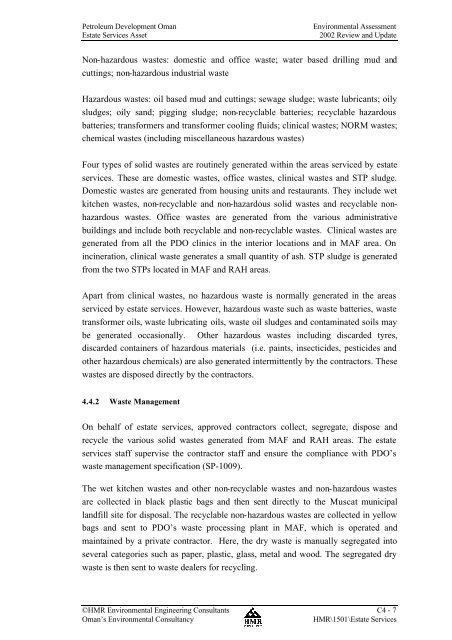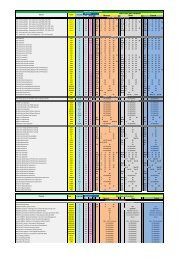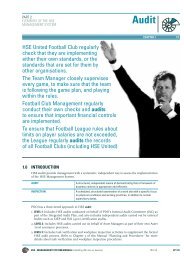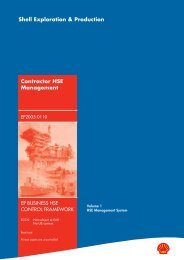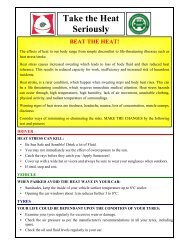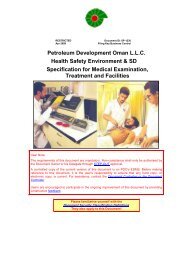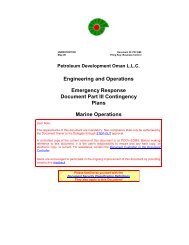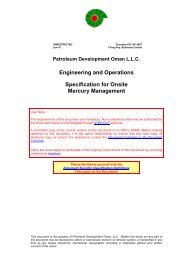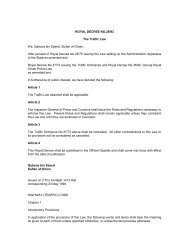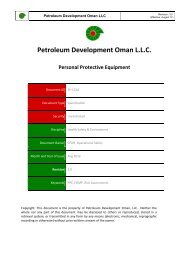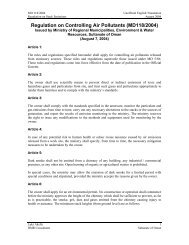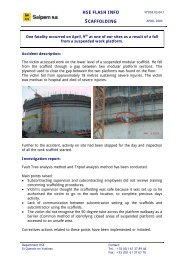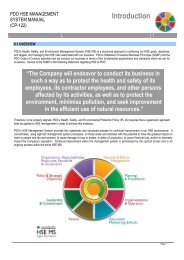Estate Service Asset - PDO
Estate Service Asset - PDO
Estate Service Asset - PDO
You also want an ePaper? Increase the reach of your titles
YUMPU automatically turns print PDFs into web optimized ePapers that Google loves.
Petroleum Development Oman<br />
<strong>Estate</strong> <strong>Service</strong>s <strong>Asset</strong><br />
Environmental Assessment<br />
2002 Review and Update<br />
Non-hazardous wastes: domestic and office waste; water based drilling mud and<br />
cuttings; non-hazardous industrial waste<br />
Hazardous wastes: oil based mud and cuttings; sewage sludge; waste lubricants; oily<br />
sludges; oily sand; pigging sludge; non-recyclable batteries; recyclable hazardous<br />
batteries; transformers and transformer cooling fluids; clinical wastes; NORM wastes;<br />
chemical wastes (including miscellaneous hazardous wastes)<br />
Four types of solid wastes are routinely generated within the areas serviced by estate<br />
services. These are domestic wastes, office wastes, clinical wastes and STP sludge.<br />
Domestic wastes are generated from housing units and restaurants. They include wet<br />
kitchen wastes, non-recyclable and non-hazardous solid wastes and recyclable nonhazardous<br />
wastes. Office wastes are generated from the various administrative<br />
buildings and include both recyclable and non-recyclable wastes. Clinical wastes are<br />
generated from all the <strong>PDO</strong> clinics in the interior locations and in MAF area. On<br />
incineration, clinical waste generates a small quantity of ash. STP sludge is generated<br />
from the two STPs located in MAF and RAH areas.<br />
Apart from clinical wastes, no hazardous waste is normally generated in the areas<br />
serviced by estate services. However, hazardous waste such as waste batteries, waste<br />
transformer oils, waste lubricating oils, waste oil sludges and contaminated soils may<br />
be generated occasionally. Other hazardous wastes including discarded tyres,<br />
discarded containers of hazardous materials (i.e. paints, insecticides, pesticides and<br />
other hazardous chemicals) are also generated intermittently by the contractors. These<br />
wastes are disposed directly by the contractors.<br />
4.4.2 Waste Management<br />
On behalf of estate services, approved contractors collect, segregate, dispose and<br />
recycle the various solid wastes generated from MAF and RAH areas. The estate<br />
services staff supervise the contractor staff and ensure the compliance with <strong>PDO</strong>’s<br />
waste management specification (SP-1009).<br />
The wet kitchen wastes and other non-recyclable wastes and non-hazardous wastes<br />
are collected in black plastic bags and then sent directly to the Muscat municipal<br />
landfill site for disposal. The recyclable non-hazardous wastes are collected in yellow<br />
bags and sent to <strong>PDO</strong>’s waste processing plant in MAF, which is operated and<br />
maintained by a private contractor. Here, the dry waste is manually segregated into<br />
several categories such as paper, plastic, glass, metal and wood. The segregated dry<br />
waste is then sent to waste dealers for recycling.<br />
©HMR Environmental Engineering Consultants C4 - 7<br />
Oman’s Environmental Consultancy<br />
HMR\1501\<strong>Estate</strong> <strong>Service</strong>s


